
Supporters of translations call for strong turnout, yellow attire at Metro Courthouse
The Tennessean reports in this article that a Metro Councilman has drafted an English-only ordinance so "all city communications would have to be in English, and only in English." The full text of the proposed non-English language ban is
here.
The article does not say whether the councilman has made a practical analysis of the impact of his proposal or the opinions of those who would have to implement it. The Tennessean says only, "It is unclear how a variety of city agencies now offering bilingual services — police, schools and Health Department, among others — would be affected." The Hispanic Nashville Notebook reported in 2004 that the greatest barriers to health care for Hispanics in the South are limited English skills and the lack of Spanish-speaking health care workers. (
story here). Presumably, upon implementation of an English-only policy, many Hispanics who are not yet fluent in English would be immediately cut off from, among other things, a multitude of Metro government communications about important subjects.
Metro currently implements a variety of multi-lingual communication strategies on topics including legal rights, a child's first day of school, domestic violence, recycling, rape victim resources, financial counseling, Homework Hotline, recidivism-reducing DUI education, pet ownership tips, access to health care, and tornado siren instructions - and none of the agencies responsible for those communications have been quoted in any of the articles on the proposed language ban.
Here are excerpts from publications of Nashville governmental agencies who might have something to say about the bill, if asked:
Nashville General Hospital"And at Nashville General, we speak your language. To serve our community's diverse population, we're proud to have one of the top interpreting programsin the community that uses both Spanish-speaking staff interpreters as well as specialists in other languages, such as Kurdish or American Sign Language for the deaf."
Public Defender's Office"[T]he Spanish speaking staff saves the state and local government money since they provide out of court translations for the Assistant Public Defenders in cases with Spanish speaking defendants or witnesses. The Public Defender's Office receives frequent requests from probation officers, court officers, and judges for assistance by the Spanish-speaking attorneys and staff. It is apparent that the various agencies of the Davidson County criminal justice system are benefiting from the availability of attorneys and other staff who are able to not only represent Spanish speakers, but who can also assist the courts to understand the many cultural issues unique to Hispanic defendants."
MDHA Fair Housing Office"It is a wonderful feeling to have friends of all creeds and nationalities. Think of all the different foods you will eat and all the different languages you will begin to learn, and all of the American ways of life you can make your new friends familiar with. Think of the ways you would want to be treated and treat others the same."

Nashville attorney Gregg Ramos* has invited members of the community to show opposition to the bill by wearing yellow and attending the bill's first reading before the Metro Council on Tuesday, September 19:
"We need a lot of people there to show our strong opposition to this unnecessarily divisive bill. The meeting starts at 7:00 p.m. [corrected from earlier reported time of 6:00 p.m.] and will be the 1st meeting back in the refurbished Metro Courthouse (not the City Hall Building where the Council meetings have been held the last 2 years). It would be great if everyone could start arriving as close to 6:00 p.m. as possible so we can show our strong opposition to everyone in Metropolitan Government."
"There will be complimentary parking at the Metro Courthouse (in the adjacent Courthouse Garage). Clerk's Office staff will disseminate parking validation coupons just outside the Council Chamber (second floor of the Courthouse) to citizens needing such. The public entrance to the Courthouse is only through the James Robertson Parkway entrance on the north side of the building at this time."
"Also, please try to wear something yellow so we can clearly identify ourselves to the Council Members as opponents of the English-only proposed bill. This could include yellow shirts, blouses, scarves, etc."
The Tennessean has published
this editorial opposing the bill:
"[The councilman] cannot claim that the effort is aimed only at illegal immigrants. Many of the non-English speaking individuals in Nashville are here legally. Many of them are trying to learn English."
"[His] ordinance would not reduce the number of immigrants in Nashville. It would not deny them jobs. What it would do is create chaos that need not exist."
"Instead of stymieing communication in Nashville, the Metro Council should look for ways to foster more English-language instruction. Short of that, Crafton's ordinance should be chalked up to political posturing at the expense of the public's well-being."
The Nashville City Paper reports in this article that an electronic billboard is calling for passage of the bill:
"'Metro Council, welcome to America, we speak English here, pass the bill, immigrants, no habla Ingles?, no freeo stuffo, from el governmento, comprende por favor?' the electronic billboard (about 50 feet tall and 48 feet wide) has read since Wednesday morning."
The billboard illustrates that the various subjects of gripes about immigrants - legal status, language fluency, and economic contribution or impact - are often intertwined. Without explanation, the "no freeo stuffo" phrase betrays the author's fusion (or confusion) of language fluency with economic dependence. Considering the non-exhaustive list above of communications currently translated by Metro into languages other than English, one has to hope the author does not truly wish to withhold communications such rape victim resources and tornado siren instructions from those who are currently receiving them.

Kudos to Metro Councilman Mike Jameson, who is also a law partner of Gregg Ramos, for publicly stating his opposition to the bill. He told the Nashville City Paper that the proposed language ban is "unnecessary and potentially dangerous."
"'No one is suggesting that anything other than English be recognized as the official language of the country or of the state or the city,' Jameson said. 'We already have a state statue that spells that out and has spelled that out for years.'"
"'If what you’re telling me to do is to tell the guy who can’t speak English who calls 911 to report that he’s having a heart attack, 'I’m sorry, call back when you learn English,' I’m not going to be a part of anything as vicious and as backward-sided as that,' Jameson said."
"'It’s just beyond me how much more hostile we can be to people when we need to be a welcoming city,' he added."
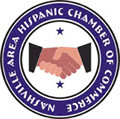
The City Paper also interviewed Yuri Cunza, president of the Nashville Area Hispanic Chamber of Commerce**, who "said the sign could be extraordinarily unwelcoming to legal immigrants new to Nashville."
"'If I’m a newcomer here, I would say that I would feel targeted. I wouldn’t think it’s friendly. It’s actually rather hostile,' Cunza said."
"'I was under the impression that Metro already spoke English,' he said. 'But I expect city leaders to be wise enough to understand the importance of tolerance and diversity as we grow our city.'"
Read more about English-only proposals in materials prepared by the
Tennessee Immigrants and Refugee Rights Coalition ("English-only laws are about the way we treat immigrants in transition") and
Wikipedia.
*Gregg Ramos is the former President of the Nashville Bar Association. He is no relation to Nashville attorney Mario Ramos.
**
Hispanic Chamber 101: There are four Hispanic chambers of commerce in Middle Tennessee: the first three are the
Franklin Area Hispanic Chamber of Commerce, the
Nashville Area Hispanic Chamber of Commerce, and the
Tennessee Hispanic Chamber of Commerce. The
Tennessean profiled these three chambers in
this article in June 2006. A fourth chamber was incorporated this year (the
Middle Tennessee Hispanic Chamber of Commerce) but no activities have been announced.
 The Marshall County Memorial Library in Lewisburg will continue to carry books in languages other than English and will have even more books in an outpouring of support and donations from the community. After a trilingual librarian was hired and a handful of county residents expressed opposition to public funds being spent on books and story times in languages other than English, the library Board of Directors stood up to the language ban concept and said that library policy would not change.
The Marshall County Memorial Library in Lewisburg will continue to carry books in languages other than English and will have even more books in an outpouring of support and donations from the community. After a trilingual librarian was hired and a handful of county residents expressed opposition to public funds being spent on books and story times in languages other than English, the library Board of Directors stood up to the language ban concept and said that library policy would not change. 
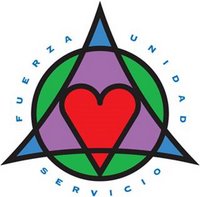
 The
The 
 Vanderbilt Hillel will honor Paul Rusesabagina, the hotel manager who saved more than 1,200 lives during the Rwandan genocide of 1994 and inspired the movie Hotel Rwanda, by designating a tree in his name at a ceremony Monday, Sept. 25, at 6 p.m. The ceremony will be held on the grounds of the Ben Schulman Center for Jewish Life at Vanderbilt University. Rusesabagina will attend the ceremony before delivering a 7 p.m. lecture at Vanderbilt’s Student Life Center. Vanderbilt Hillel, an organization representing the university’s Jewish community, is honoring Rusesabagina for his “work towards advancing the well-being of humanity as a whole.” Often dubbed as the “Oscar Schindler of Africa,” he sheltered more than 1,200 Tutsis and moderate Hutus during the Rwandan genocide.
Vanderbilt Hillel will honor Paul Rusesabagina, the hotel manager who saved more than 1,200 lives during the Rwandan genocide of 1994 and inspired the movie Hotel Rwanda, by designating a tree in his name at a ceremony Monday, Sept. 25, at 6 p.m. The ceremony will be held on the grounds of the Ben Schulman Center for Jewish Life at Vanderbilt University. Rusesabagina will attend the ceremony before delivering a 7 p.m. lecture at Vanderbilt’s Student Life Center. Vanderbilt Hillel, an organization representing the university’s Jewish community, is honoring Rusesabagina for his “work towards advancing the well-being of humanity as a whole.” Often dubbed as the “Oscar Schindler of Africa,” he sheltered more than 1,200 Tutsis and moderate Hutus during the Rwandan genocide. 

 Bilingual Spanish/English worship singer Marco Barrientos will perform at the Cornerstone Church, 726 West Old Hickory Blvd., in Madison, Tennessee on Saturday, September 23 at 7:00 p.m. For more information, call 615-397-2973 or 615-586-8437.
Bilingual Spanish/English worship singer Marco Barrientos will perform at the Cornerstone Church, 726 West Old Hickory Blvd., in Madison, Tennessee on Saturday, September 23 at 7:00 p.m. For more information, call 615-397-2973 or 615-586-8437.
 Nashville attorney Gregg Ramos* has invited members of the community to show opposition to the bill by wearing yellow and attending the bill's first reading before the Metro Council on Tuesday, September 19:
Nashville attorney Gregg Ramos* has invited members of the community to show opposition to the bill by wearing yellow and attending the bill's first reading before the Metro Council on Tuesday, September 19: The Tennessean has published
The Tennessean has published  Kudos to Metro Councilman Mike Jameson, who is also a law partner of Gregg Ramos, for publicly stating his opposition to the bill. He told the Nashville City Paper that the proposed language ban is "unnecessary and potentially dangerous."
Kudos to Metro Councilman Mike Jameson, who is also a law partner of Gregg Ramos, for publicly stating his opposition to the bill. He told the Nashville City Paper that the proposed language ban is "unnecessary and potentially dangerous." The City Paper also interviewed Yuri Cunza, president of the Nashville Area Hispanic Chamber of Commerce**, who "said the sign could be extraordinarily unwelcoming to legal immigrants new to Nashville."
The City Paper also interviewed Yuri Cunza, president of the Nashville Area Hispanic Chamber of Commerce**, who "said the sign could be extraordinarily unwelcoming to legal immigrants new to Nashville."

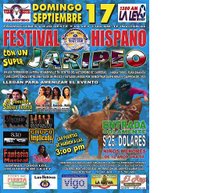
 Primera Iglesia Metodista Unida Hispana (First Hispanic United Methodist Church) will be celebrating Hispanic Heritage Month with a bi-lingual service on the October 1 at 10 a.m. followed by an international food fair serving dishes from accross the Americas. This event is FREE and all are welcome.
Primera Iglesia Metodista Unida Hispana (First Hispanic United Methodist Church) will be celebrating Hispanic Heritage Month with a bi-lingual service on the October 1 at 10 a.m. followed by an international food fair serving dishes from accross the Americas. This event is FREE and all are welcome.  Franklin Area Hispanic Chamber of Commerce
Franklin Area Hispanic Chamber of Commerce

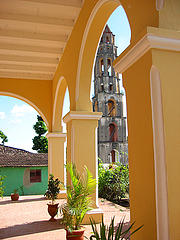
 5th. 'Tango by Moonlight'
5th. 'Tango by Moonlight'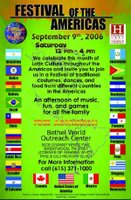

 John J. Thatamanil, assistant professor of theology at Vanderbilt Divinity School,
John J. Thatamanil, assistant professor of theology at Vanderbilt Divinity School, 



 The U.S. Conference of Catholic Bishops issued a Labor Day call for a welcoming environment for immigrants in the U.S.
The U.S. Conference of Catholic Bishops issued a Labor Day call for a welcoming environment for immigrants in the U.S.